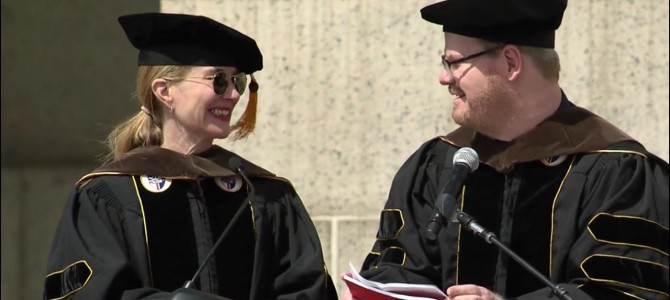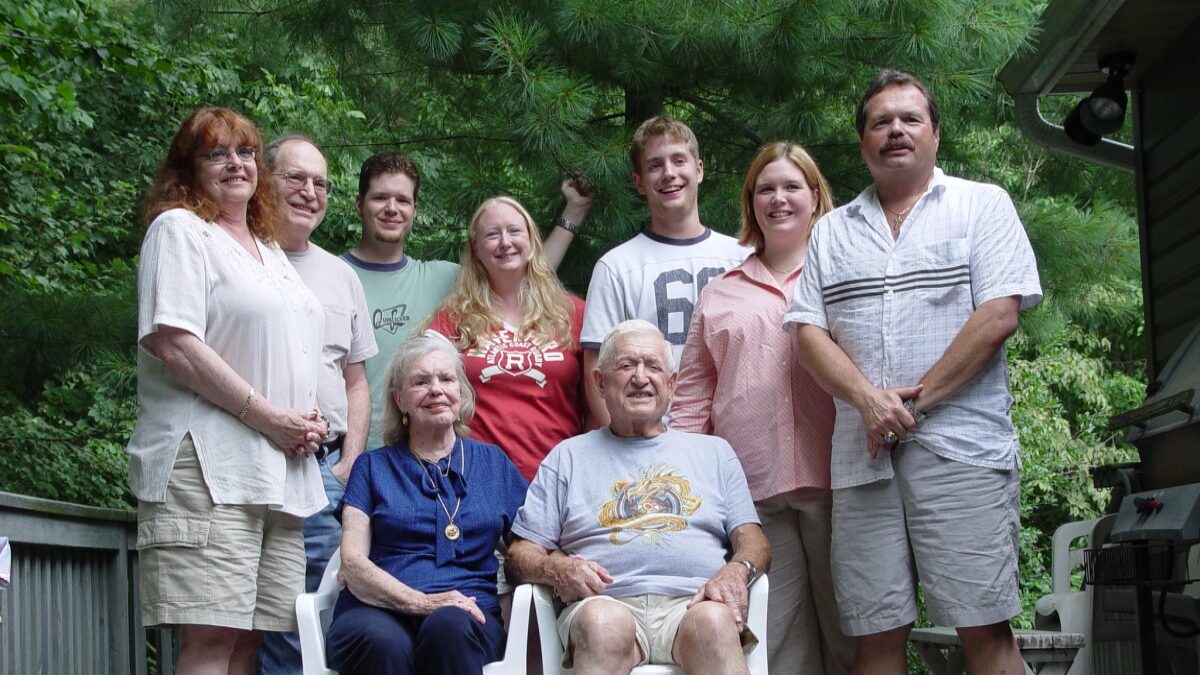
“Spot the odd line in this great story,” a journalist friend wrote to me, from The Boston Globe’s, “Father’s labor of love puts 5 kids through Boston College:”
For the last 15 years of his long working life, Vautour, 62, has performed his painstaking rounds on the graveyard shift at Robsham Theater as if they were a calling. And, in a sense, they are.
Next month, his youngest child will collect her nursing degree from BC, and Vautour’s triumph will be complete: The night-shift custodian will have put all five of his children — Amy, John, Michael, Thomas, and Alicia — through Boston College.
The story about Boston College custodian Fred Vautour is really great, so I hate to quibble. But “as if they were a calling”? As if? Fatherhood — and all the sacrifices and hard work it entails — must be one of life’s most noble callings. Vautour lived out his vocation as father as he “sponged down sinks, scrubbed toilets, and polished mirrors.”
Yet lives of service are not considered callings in our culture. In this case it’s a father whose household management is dismissed as not quite a calling. Typically we see such dismissiveness aimed at women who stay home to raise their children. We also see it aimed at women who make different decisions, in service to their family or prospective families, about their education, their career path, and even their work-life balance in a given job. These women — whose different choices are responsible for the so-called “pay gap” — are hidden from our media’s corporatist discussions of women at work.
That is what makes three of this year’s commencement addresses to college graduates so interesting.
(1) Sheryl Sandberg
Sheryl Sandberg, Facebook’s chief operating officer and author of “Lean In,” spoke at the University of California, Berkeley, on Saturday. Leading up to her speech, Sandberg admitted that parts of her book, which encourages women to embrace corporate culture aggressively, were wrong. She said she realized this after the sudden and unexpected death of her husband last year. “I did not really get how hard it is to succeed at work when you are overwhelmed at home,” she wrote in a Facebook post. Her answer, for whatever it was worth, was more corporatism and government programs to help single mothers.
Her speech, which was the weakest of the three we’ll look at, was given in the style of a secular Elmer Gantry. The message she was selling this weekend was conveniently packaged in three Ps:
Psychologist Martin Seligman found that there are three P’s — personalization, pervasiveness, and permanence — that are critical to how we bounce back from hardship. The seeds of resilience are planted in the way we process the negative events in our lives.
She said she learned not to take her husband’s death personally or to blame herself. She learned that his death didn’t need to pervade every aspect of her life. She went quickly back to work, and that helped her not think so much about his death. And she learned that just because she was really sad at first, it didn’t mean she would always be that level of sad.
OK, fine. Good advice, even. But the end of her speech was much better. There she said that finding gratitude and appreciation are the key to resilience. She’s learned to be thankful:
It is the greatest irony of my life that losing my husband helped me find deeper gratitude — gratitude for the kindness of my friends, the love of my family, the laughter of my children. My hope for you is that you can find that gratitude — not just on the good days, but on the hard ones, when you will really need it.
I hope that you live your life — each precious day of it — with joy and meaning. I hope that you walk without pain — and that you are grateful for each step.
The kindness of friends, the love of family, the laughter of children. Yes! These are worth infinitely more than even the piles of cash that Facebook executives get.
“Lean In” was a fine book, I suppose. Some of the advice was good. But it assumed women should have corporatist or career-minded approaches to their lives and failed to recognize the importance of relationships to women’s lives. We excel at forming and sustaining relationships, most importantly within our families but also in the larger community. These relationships take care of people emotionally and physically for far more than we get credit. Worse, many media elites denigrate that important work because it’s not as easy to capitalize on as an office culture is.
By adopting a male-oriented mindset regarding careers, we can’t help but miss the value of these relationships. Wealthy and privileged people are particularly prone to miss the importance of these networks. It’s a wonderful sign that Sandberg is beginning to understand the importance of non-corporate relationships, but she needs to develop her understanding far more. Feminist legal theorists have been actively trying to discourage single mothers from getting married, as Stella Morabito has discussed previously. That only makes life harder for women and the children they raise. It’s not healthy for men, either.
(2) Clarence Thomas
The Washington Examiner‘s Joel Gehrke reported:
Supreme Court Justice Clarence Thomas urged college graduates who seek to ‘preserve liberty’ to do so by fulfilling the duties of their daily vocations rather than attempting to achieve sweeping political goals.
‘At the risk of understating what is necessary to preserve liberty in our form of government, I think more and more that it depends on good citizens, discharging their daily duties in their daily obligations,’ Thomas said Saturday during a commencement address at Hillsdale College, a small liberal arts college in Michigan.
Also:
Thomas discouraged the audience from prioritizing government service and trying to ‘change the world’ over other work.
‘I resist what seems to be some formulaic or standard fare at commencement exercises, some broad complaint about societal injustice and at least one exhortation to the young graduates to go out and solve the stated problem or otherwise to change the world,’ he said. ‘Having been where you are, I think it is hard enough for you to solve your own problems, not to mention those problems that often seem to defy solution. In addressing your own obligations and responsibilities in the right way, you actually help to ensure our liberty and our form of government.’
It’s an interesting contrast with President Barack Obama’s commencement address to Howard University the week prior — an overwhelmingly political speech. Obama repeatedly and strenuously encouraged the students to lead lives of political activism. That is fine, but just very different.
Thomas, according to Gehrke, concluded by telling the graduates to “thank their families and teachers — ‘these are the people who have shown you how to sacrifice for those they love, even when that sacrifice is not always appreciated,’ he said — and to be kind to those in need. ‘As you go through life, try to be that person whose actions teach others how to be better people and better citizens,'” he said.
Discharging daily duties in daily obligations is worthy of praise, and the life and accomplishments of the custodian Vautour is a testament to that. How nice it is to see someone of such stature remind graduates of the holiness of daily sacrifice for those people who are in our care, whether they are our spouses, children, or students.
(3) Jim and Jeannie Gaffigan
Comedian Jim Gaffigan and writer Jeannie Gaffigan spoke at Catholic University of America this weekend. They had a surprisingly good speech. The two have been married since 2003 and are the parents of five.
‘In spite of our self-doubts and our flaws, the impossible became possible,’ Jeannie said. ‘But neither of us could have accomplished much of anything by ourselves,’ added Jim, the author of two books, a Grammy nominee for his successful comedy specials, and the star of a TV Land series, The Jim Gaffigan Show. …
When the couple met and began dating, they both changed for the better. Jeannie realized how difficult, but rewarding it can be to help those you love fulfill their dreams. ‘Sharing your life with someone is not easy because it involves sacrificing control,’ she said. ‘And something beautiful can happen.’
Jim, on the other hand, realized there was more to life than simply seeking fame and worldly accomplishments. He noted that before he met Jeannie, he lived across the street from a Catholic church for 15 years that he had never entered. Because of his wife, he was married in that church, his children were baptized there, and ‘once a week I’m reminded to keep focused on priorities. God, family then work,’ Jim said.
‘Beliefs I had doubted, I opened my mind to,’ he said. ‘Maybe marriage wasn’t giving up freedom. Maybe faith in something wasn’t naïve. Maybe putting others first wasn’t weakness.’
Putting others first is definitely not part of the “Lean In” mantra, but it’s what a life of vocational understanding entails. As vocation expert Gene Veith has written:
Essentially, one’s vocation is to be found in the place one occupies in the present. A person stuck in a dead-end job may have higher ambitions, but for the moment, that job, however humble, is one’s vocation. Flipping hamburgers, cleaning hotel rooms, emptying bedpans all have dignity as vocations, spheres of expressing love of neighbor through selfless service, in which God is masked. Perhaps later, another vocation will present itself. But vocation is to be found not simply in future career decisions, but in the here and now. Nor can one use the excuse of ‘not having a vocation for marriage’ for getting a divorce, or claim ‘not having a vocation for parenthood’ as a way to dump child-raising responsibilities. If you are married, that’s your vocation. If you have children, they are your vocation.
Vocations are also multiple. Any given person has many vocations. A typical man might be, simultaneously, a husband (serving his wife), a father (serving his children), a son (serving his still-living parents), an employer (serving his workers), an employee (serving his bosses), a citizen (serving his country). Note how a person at a particular job can be both a ‘master,’ charged with supervising subordinates, and, at the same time, a ‘servant,’ answerable to superiors, whether a CEO or stockholders. Leadership and submission may both be called for, as the different vocations make their claims.
The Gaffigans’ speech was about all the things they thought would be impossible — getting married, having five children, writing a book and, for Jim, opening a mail-order guacamole business. They accomplished all but one of those goals thanks to help from God and loved ones, they said.
Jim ended their speech by joking, “Remember, happiness is not found in accomplishments, income, or the number of Twitter followers you have. True happiness is found in family. Living for each other, sacrificing together, and enjoying the blessing of fresh guacamole delivered promptly to your door.”









